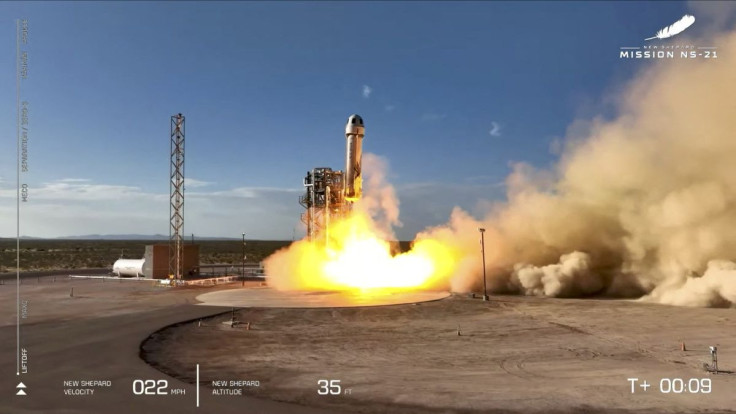Space Launches, Tourism Could Affect Climate And The Ozone Layer: Scientists
KEY POINTS
- Soot emissions from rockets warm the atmosphere more efficiently than other sources
- Emissions from rocket launches may "undermine" the current ozone recovery
- There's a need for environmental regulation in the industry, the researchers said
Rocket launches and space tourism may actually affect our climate and the recovering ozone layer, a study has found.
The space industry is among the "fastest-growing sectors" in the world, the authors of the study, published in the journal Earth's Future, said. The industry has been forecast to grow from $350 million in 2019 to a whopping $1 trillion by 2040, and companies like Blue Origins, SpaceX and Virgin Galactic have fueled an interest in space tourism as of late.
"It is imperative that we understand the current and future risks to Earth's atmosphere posed by pollution from rocket launches and re-entry heating of reusable and discarded rocket parts and historical debris," the authors of the study wrote. "Rockets, unlike other anthropogenic pollution sources, emit gaseous and solid chemicals directly into the upper atmosphere."
For their work, the researchers compiled an inventory of the chemicals from the rocket launches and re-entries in 2019 as well as the projected growth of space tourism based on the "recent billionaire space race," University College London (UCL) noted in a news release. They then incorporated it into a 3D model to look at its possible effect on climate and the stratospheric ozone layer.
Indeed, the researchers found that the soot emitted by rockets is nearly 500-times more efficient at warming the atmosphere than all the other sources of soot (surface and aircraft) combined.
"Soot particles from rocket launches have a much larger climate effect than aircraft and other Earth-bound sources, so there doesn't need to be as many rocket launches as international flights to have a similar impact," the study's co-author, Eloise Marais of UCL Geography, explained in the news release.
"Warming due to black carbon (BC) is 3.9 mW m−2 from a decade of contemporary rockets, dominated by emissions from kerosene-fueled rockets," the researchers wrote. "This more than doubles (7.9 mW m−2) after just three years of additional emissions from space tourism launches, due to the use of kerosene and hybrid synthetic rubber fuels."
The researchers called the soot particles from rocket launches "of great concern."
The Montreal Protocol
Researchers also found that even though the current ozone loss from rocket launches is considered to be "small," routine space tourism launches could actually "undermine" the recovery that has been achieved through the Montreal Protocol. It's the "landmark" agreement that regulates the production of ozone-depleting man-made chemicals. It is said to be one of the "most successful international environmental policy interventions," according to UCL.
"The only part of the atmosphere showing strong ozone recovery post-Montreal Protocol is the upper stratosphere, and that is exactly where the impact of rocket emissions will hit hardest," Robert Ryan, study co-author, said, as per the news release. "We weren't expecting to see ozone changes of this magnitude, threatening the progress of ozone recovery."
Space tourism soot #emissions could have a bigger #climate effect than the aviation industry if left unregulated, with rockets also causing ozone damage, finds new research led by Dr Rob Ryan @rsquared_aus & Dr Eloise Marais @UCLgeography @UCLSocHistSci https://t.co/3Rdveg0fEd
— UCL News (@uclnews) June 25, 2022
Overall, this shows the "rapidly growing industry" in a new light. It also stresses the need for a discussion on its potential environmental impacts, the researchers said.
"This study allows us to enter the new era of space tourism with our eyes wide open to the potential impacts," Ryan added. "The conversation about regulating the environmental impact of the space launch industry needs to start now so we can minimize harm to the stratospheric ozone layer and climate."

© Copyright IBTimes 2025. All rights reserved.






















